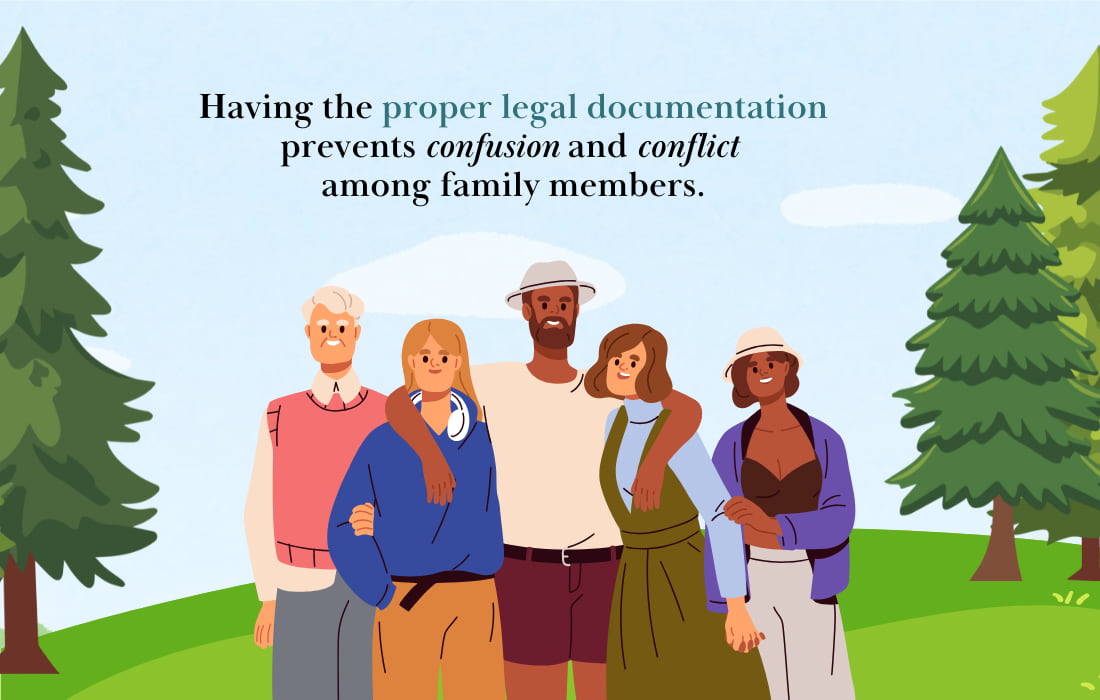Why Is Estate Planning Important?
Estate planning isn’t exactly a thrilling task. But it’s beneficial and meaningful to those you love.
So, what is estate planning, and how does it help your loved ones?
Estate planning ensures your money, property, and other assets are distributed according to your wishes. A good estate plan can reduce taxes, avoid legal delays, and help your loved ones skip probate. An estate plan protects your beneficiaries and makes it easier for them to access their inheritance during a difficult time.
And remember, a will isn’t an estate plan. A will is just part of a comprehensive estate plan. To learn more about the benefits of estate planning and the 10 biggest myths of estate planning, keep reading!
Written By Tiffany Woodfield, Financial Coach, TEP®, CRPC®, CIM®

How Estate Planning Is Beneficial to Your Loved Ones
While estate planning provides a great many benefits, here are the 5 top benefits of estate planning:
- Ensures your assets are distributed according to your wishes, not default provincial or state laws
- Reduces the financial and emotional burden on your family during a difficult time
- Helps minimize taxes, legal fees, and delays through probate
- Protects beneficiaries, including minor children or dependents with special needs
- Allows you to plan for incapacity by naming trusted individuals to make financial and medical decisions on your behalf
What Is Estate Planning?
Estate planning is the process of organizing your money, property, and belongings for after you are gone.
An estate plan acts as a guide, helping your family and loved ones understand your wishes. Typically, it includes a will, which is a legal document that outlines who will receive your assets. Estate planning can also involve setting up trusts, making decisions about medical care, and designating guardians for your children. By having a solid plan in place, you can make a difficult time easier for those you care about.
10 Biggest Myths about Estate Planning
You’re sitting at your desk with a pile of work to take care of.
Your kids are downstairs screaming about who knows what. And dinner isn’t going to make itself. The last thing you want to do is think about estate planning.
But you know that your will isn’t up to date, you haven’t really thought about (sigh) what will happen after your death, and you definitely don’t have your digital assets organized! If something were to happen to you or your husband, you’re pretty sure that the subsequent paperwork mess would be a nightmare.
When you’re busy—like most modern humans—estate planning feels like a monumental hassle.
But if you read through these 10 myths about estate planning, you might start to feel more motivated.
Proper estate planning isn’t just a “nice to have.” It is absolutely critical for anyone who has assets (of any amount). And just having a will isn’t enough.
1. Thinking everything will automatically go to your spouse or kids.
Many people assume their assets will pass directly to their closest family members, but that’s not always true. Without a will or legal estate plan, your estate may be divided based on default provincial or state laws, which can lead to unintended outcomes, especially in blended families or second marriages.
2. Underestimating the work involved in being an executor and thinking it’s an honour.
Being an executor is not just symbolic—it’s a job with legal and financial responsibilities that can last months or even years. If your executor isn’t equipped or willing to take on the role, it can delay the process and cause unnecessary stress for the family.
3. Not realizing that without an estate plan, your money and belongings can be frozen, leaving your family vulnerable.
If your estate isn’t organized, banks and institutions may freeze access to accounts and property. Your family could be left scrambling to pay for bills, funeral expenses, or taxes, right when they’re already overwhelmed with grief.
4. Not realizing the impact of taxes and how they can be minimized through planning.
Many people are surprised by how much tax their estate could owe, especially in cross-border or high-net-worth situations. With proper planning, you can significantly reduce taxes and preserve more of your wealth for the next generation.
5. Underestimating the conflicts that can arise if you don’t have family meetings to discuss your plans while you’re still alive.
Avoiding conversations about your estate doesn’t prevent conflict—it often fuels it. A simple discussion now can save your family years of legal battles, resentment, and damaged relationships later on.
6. Underestimating the drama.
Even in close families, grief can amplify tensions. Estate issues can bring out old wounds, sibling rivalries, or mistrust, especially when expectations are not met or plans were never shared.
7. Thinking it’s too expensive to create an estate plan and not realizing the cost of not planning is far greater.
While working with professionals has a cost, the legal fees, taxes, and delays from not planning can quickly add up. For high-net-worth families, the cost of doing nothing often far exceeds the investment in doing it right.
8. Thinking you don’t have enough assets to need an estate plan.
Estate planning isn’t just for the ultra-wealthy. It’s about protecting your wishes and making life easier for your family. Even modest estates can face issues like probate, taxation, and disputes without a clear plan.
9. Not realizing the rights of family members and the power they have to contest the will if treated unfairly.
If someone feels they were unjustly excluded or shortchanged, they may have legal grounds to challenge the will. This can delay settlement, drain estate resources, and cause years of emotional and legal turmoil.
10. Underestimating the conflicts that can arise and last for years, destroying your legacy.
Long, drawn-out estate battles are more common than most expect, especially when communication was lacking or planning was incomplete. A thoughtful estate plan can prevent misunderstandings and preserve your legacy for future generations.

Why Is Your Estate Plan Mission Critical?
Your estate plan is mission-critical because it ensures that your wishes are honoured and your loved ones are taken care of once you’re no longer there to make decisions.
Without a clear plan, your assets might be divided according to state laws, which may not align with what you want. An estate plan also reduces confusion and conflict among family members during an already difficult time. You can include your medical and financial preferences, ensuring that the right people are making decisions on your behalf.
The Estate Planning Process
Here’s a simple step-by-step process for estate planning:
1. Make a List of Your Assets: You need to include money, property, investments, and all your belongings to understand what you have to plan for.
2. Identify Your Goals: Think about what you want to happen with your assets after you’re gone. Take time to consider things such as who will get a sentimental item or who really values certain things.
3. Choose an Executor: Select a trusted person who will be responsible for carrying out your wishes as outlined in your estate plan. Remember, acting as an executor is a daunting task and not necessarily an honour. I recommend not naming all your children as executors, as it can cause delays and conflict. They need to agree on everything, and if they don’t, they’ll run into problems. You may want to consider a third-party executor, as they often charge similar to what a family member is entitled to for the work involved.
4. Create Legal Documents: Work with an estate lawyer to draft essential documents, such as a will, trusts (if needed), and advance healthcare directives. These documents will specify your wishes and ensure they are legally recognized.
5. Review and Update Regularly: Life changes—like marriage, divorce, or the birth of a child—can affect your estate plan. Regularly review and update your plan to reflect your current situation and wishes.
Essential Documents for Estate Planning
Make sure you have all of these key documents prepared:
- Last Will and Testament: It explains how assets are distributed and who will manage your estate.
- Power of Attorney (POA): A POA allows someone to make financial or legal decisions on your behalf if you’re incapacitated.
- Health Care Proxy or Power of Attorney for Personal Care (Canada) / Medical Power of Attorney (U.S.): It appoints someone to make health care decisions if you’re unable to.
- Advance Directives or Living Wills: They state your wishes for end-of-life care or medical treatment in case of incapacity.
- Digital Assets and Estate Planning: This document specifies access and control of online accounts, crypto wallets, or cloud storage after death.
- Letter of Intent: It’s a non-binding document explaining your wishes, such as funeral instructions or messages to heirs.
- Beneficiary Designations: They ensure accounts like life insurance and registered plans (RRSPs, TFSAs, 401(k)s) go to the right people, outside the will.
- Guardianship Designations for Minor Children: Name the person(s) you want to care for your children if you pass away before they reach adulthood.
- Estate Inventory or Asset List: This is a master list of your accounts, properties, insurance policies, and digital access information.
- Trust Documents: Includes revocable or irrevocable trusts used to manage and distribute assets during life or after death.
Note: Not everyone needs a trust when doing estate planning. Consult your wealth management team or an estate planning expert in your area to find out if you need a trust.
Power of Attorney in Estate Planning
A Power of Attorney (POA) is a legal document that allows you to designate someone to make decisions on your behalf if you become unable to do so yourself.
This can include decisions about your finances, medical care, and other important matters. The reason it is so important to create a POA is that it makes sure someone you trust is in charge of your affairs when you can’t manage them.
Many people assume their spouse or partner will automatically be able to assume this role, and it isn’t as simple as this. Having the proper legal documentation prevents confusion and conflict among family members.

Creating a Will
When creating your will, start by clearly identifying your assets and determining who you want to inherit them.
You will want to consider items of both monetary and sentimental value, and make sure to name alternative beneficiaries in case your first choices are unable to inherit. It’s also important to appoint an executor, a trusted person responsible for carrying out your wishes and managing the estate. I recommend getting legal advice because you want to be sure your will is valid.
Finally, creating a will usually isn’t a one-time event because, as we know, life changes. That is why it is important to regularly review your will to keep it updated.
Setting Up Trusts
Trusts are powerful tools that can help manage and protect your assets during your lifetime and beyond.
They can provide privacy, avoid probate, and offer greater control over how and when your assets are distributed. Trusts are especially useful for families with complex needs, such as cross-border considerations, blended families, or beneficiaries with special needs.
Protecting Beneficiaries Through Estate Planning
A well-structured estate plan ensures that your beneficiaries are protected—financially and emotionally—when they need it most.
It allows you to control how and when assets are distributed, which is especially important for younger heirs or those who may not be financially savvy. Estate planning also helps shield beneficiaries from potential creditors, lawsuits, or relationship breakdowns that could otherwise compromise their inheritance.
The Importance of Safeguarding Young Children
If you have young children, estate planning is one of the most important gifts you can give them.
Naming a guardian in your will ensures someone you trust will raise your children if you’re not there. You can also set up trusts to provide financial support in a structured, tax-efficient way until they are old enough to manage their inheritance.
The Role of Life Insurance in Estate Planning
Life insurance plays a crucial role in ensuring your family has the liquidity they need after your death.
It can cover final expenses, pay off debts, or be used to equalize inheritances among beneficiaries. For high-net-worth families, life insurance can also help offset estate taxes or fund long-term goals like charitable giving or education.
Minimizing Taxes for Heirs
Without proper planning, a significant portion of your estate could go to taxes instead of your loved ones.
Estate planning allows you to explore strategies such as gifting, trusts, and insurance to reduce the tax burden on your heirs. Cross-border families must be particularly careful, as they may be subject to tax rules in more than one country.
Avoiding Family Disputes
Estate planning helps prevent the misunderstandings and conflicts that can arise when family members are left to guess your intentions.
Clear documentation and communication can reduce the chance of contested wills or long-term rifts between siblings. Taking the time now to set expectations and involve your family in the planning process is one of the best ways to preserve harmony.
How to Choose an Executor or Trustee
Choosing the right executor or trustee is essential—they’ll be responsible for carrying out your wishes and managing your estate’s affairs.
You want someone who is organized, impartial, and able to handle the legal and financial responsibilities involved. In many cases, especially for complex or cross-border estates, a corporate executor or professional trustee may be a wise choice.
Privacy and Probate Considerations
When your estate goes through probate, it becomes a matter of public record, which can compromise your family’s privacy.
Using tools like trusts can help keep your estate affairs private and out of court. Avoiding probate can also save time and reduce legal fees, making the transition easier for your loved ones.

Keeping Your Plan Up to Date
An estate plan isn’t something you create once and forget.
As your life evolves, so should your plan. Regular updates ensure your documents reflect your current wishes, protect your beneficiaries, and comply with legal and tax requirements.
When to Review Your Estate Plan
Review your estate plan every three to five years, or any time you experience a major life change. Even small changes in finances or relationships can affect how your estate should be handled.
Life and Financial Events That Trigger an Update
Some of the most common triggers for updating your plan include:
- Marriage or divorce
- Birth or adoption of a child
- Death of a spouse, beneficiary, or executor
- Receiving a large inheritance or selling major assets
- Moving to another province, territory, or country
- Starting a business
- Buying property
- Selling a business
Responding to Legal or Tax Law Changes
Estate laws and tax rules can change over time, especially in cross-border situations. Keeping your plan aligned with current regulations can help minimize tax burdens and avoid delays for your heirs.
Updating Beneficiaries and Executors
Relationships evolve, and so do people’s capacities to serve in key roles. Periodically review your executor, power of attorney, trustee, and beneficiary designations to make sure they’re still appropriate and aligned with your intentions.

Common Questions about Estate Planning
Who benefits most from estate planning?
This is a difficult question to answer because if you are a single parent and have young children without doing any estate planning, your kids’ future is in jeopardy.
However, high-net-worth individuals and families may benefit the most financially. This is especially true when they have complex assets, cross-border ties, or dependents to protect. An estate plan provides clarity, reduces taxes, and prevents legal complications for your loved ones.
At what net worth should I start doing estate planning?
If you have $2 million or more in investable assets, own property, or have dependents, it’s time to prioritize estate planning. The more complex your financial life, the more critical this becomes.
What should I prioritize when creating an estate plan?
Start with naming trusted individuals for key roles like executor and power of attorney. Then, ensure your will, beneficiary designations, and any trusts align with your wishes and minimize taxes.
What are the main issues to consider in estate planning?
Consider taxation, probate, family dynamics, guardianship for children, and cross-border legal rules. Each element plays a vital role in protecting your wealth and preserving your legacy.
When should I consider using trust funds in my estate planning?
Trusts are helpful when you want to control how assets are distributed, avoid probate, or provide for minors or dependents with special needs.
They’re especially valuable for cross-border families and complex estates. Make sure you seek the advice of a good estate planning attorney when doing complex estate planning.
Who can help me minimize estate taxes?
Work with a cross-border wealth advisor, estate lawyer, and accountant who understand both Canadian and U.S. tax systems. A team-based approach ensures nothing is missed.
What is a personal representative or executor?
This is the person legally responsible for carrying out the instructions in your will. They manage assets, pay debts, and distribute your estate according to your plan.
Key Estate Planning Considerations:
- When you think about all the family members who may be affected by your estate plan, including children, the importance of estate planning becomes clear.
- Proper planning helps avoid delays, legal disputes, and unnecessary taxes after your death.
- Review and update your estate plans regularly to reflect changes in assets, relationships, or your intentions.
- Be intentional when transferring assets, especially if you have complex holdings like businesses, properties, or international investments.
- Take time to consider family dynamics—tensions or unequal distributions can lead to conflict if not handled with care and clarity.
- Choose an executor or trustee who is trustworthy, organized, and capable of managing legal and financial responsibilities
- If you or your beneficiaries live in different countries, account for cross-border rules that may affect taxes and probate
- Include powers of attorney and advance directives in case you become unable to make decisions yourself
- Consider how charitable giving fits into your estate plan and how to structure it for tax efficiency
- Document digital assets like online accounts, crypto holdings, and passwords to ensure they aren’t lost or inaccessible
- If you own a business, create a clear business succession plan to protect its value and ensure a smooth transition
- Coordinate your life insurance with your estate plan to provide liquidity, equalize inheritances, cover taxes, and achieve your financial goals

Final Thoughts
Nobody relishes thinking about death.
But almost everyone hopes that their family and loved ones will thrive even after they’re gone. The true purpose of estate planning is to take care of those you love.
When you do your estate planning right, you can ensure the people you love the most in the world aren’t left cleaning up a mess after you’re gone. Instead, they can hold onto beautiful memories and the legacy you decide to leave.
Get the Free Guide and Audio Meditation for Manifesting Your Dreams
Pop your email address in the form below to get my easy checklist and guide to manifesting and the guided audio meditation to help you get started.
You’ll also get one or two emails per month with the latest blog posts about abundance, wealth-building, manifesting, and creating a fulfilling life.
Read More:
💎 Simple Estate Planning Checklist for Canadians
💎 Who Needs to Do Estate Planning?
💎 What Questions Should I Ask an Estate Planner?
About the Author

TIFFANY WOODFIELD is a financial coach, cross-border expert, and the co-founder of SWAN Wealth based out of Kelowna, BC. As a TEP and associate portfolio manager, Tiffany has extensive experience working with successful professionals who want to leave a legacy and enjoy an adventurous, work-optional lifestyle. Tiffany combines extensive knowledge from her background as a financial professional with coaching and her passion for personal development to help her clients create a unique path that allows them to live their fullest potential. Tiffany has been a regular contributor to Bloomberg TV and has been interviewed by national and international publications, including the Globe and Mail and Barron’s.